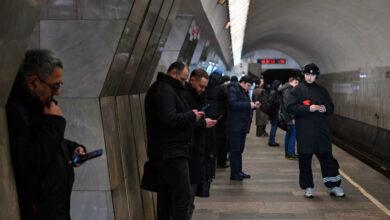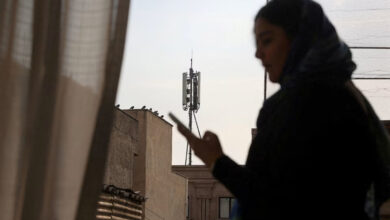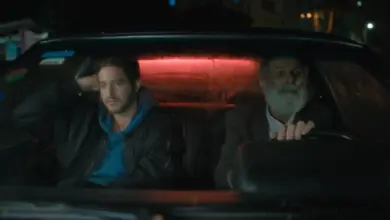In the violent chaos of a neighborhood-wide sectarian riot, an elderly Muslim man is knocked to the ground and about to be trampled to death. As the crowd thickens around him, he sees an open hand reaching out to him. Gripping it tightly, he is dragged to safety by his Coptic neighbor and friend. United, the two men quickly locate their families and, hand in hand, attempt to make their way out of the violent crowd. A stray blade slashes the Muslim father’s cheek; a bottle shatters against his Coptic neighbor’s forehead. Nevertheless, the two men and their families march on, battered heads held high.
Although set in Alexandria, the scene was filmed a full two years before last Saturday’s church bombing in the northern Egyptian city; it constitutes the climax of “Hassan we Morcos” (Hassan and Morcos), a 2003 big-budget release starring Egyptian screen legends Adel Imam and Omar Sharif.
The film attracted substantial controversy before it was even released. Several groups called for boycotting the film, due to the taboo storyline in which a sheikh and priest are forced to live under fake names and lie about their beliefs in order to escape extremists. But the buzz around “Hassan we Morcos” faded soon after its premiere, as the movie turned out to be a predictably naïve, and often corny, take on an issue that, now more than ever, begs to be taken seriously.
The tense relationship between Egypt’s Muslim and Christian populations has, so far, largely evaded any form of analytical cinematic treatment, and Copts are an even greater minority onscreen than off. “When watching an Egyptian movie, audiences take it for granted that the characters onscreen are Muslim,” noted film critic Sherif Awad. “Even on the rare occasion that a filmmaker identifies a character as Coptic, it’s usually carried out in a way that’s completely peripheral to the film’s plot.”
Awad furthermore suspects that when a Copt is featured in cinema, it is more of a tenuous attempt at generating hype than legitimate social analysis. “Hassan we Morcos,” he believes, was a “good idea that quickly descended into superficial propaganda.”
As Awad pointed out in a conversation with Al-Masry Al-Youm, cinema’s depiction of Copts “is an issue that has never been directly discussed,” although not for lack of trying.
The problem seems to originate with the Egyptian Board of Censors, a large collective of individuals under the auspices of the Ministry of Culture that has final say over the content of any completed film and insists on reading and approving screenplays before allowing filmmakers to enter production. Among several taboos, including sex and politics, religion is arguably met with the most apprehension, particularly when the focus is on Muslim-Christian relations. “State censors worry when the intended depiction is too realistic, or if it cuts too close to the bone,” Awad explained. “They feel like they are protecting audiences and ensuring national unity.”
For Awad and many others, the “over-protectiveness” is hypocritical. “They [the censors] don’t seem to realize the extent of the damage being done by the films they approve of and encourage,” Awad said, adding that with every naïve, token portrayal, the possibility of an enlightened discussion becomes more remote.
“They stifle filmmakers concerned with valid social dilemmas,” he said angrily, “and instead throw trash like ‘Bon Soiree’ onto our screens,” referring to the most recent assault on moviegoers, courtesy of the notoriously sleazy al-Sobky production company.
Censorship has only grown more rampant in recent years. Filmmakers, once celebrated for their boldness in tackling relevant social concerns, have since fallen–or been forced off–the map, a fact widely lamented by the nation’s film enthusiasts. Awad sighed, “Atef el-Tayeb is dead, Mohamed Khan struggles to find work, and Dawoud Abdel Sayed–God bless him–makes a film every ten years.”
Abdel Sayed, internationally acclaimed director of several Egyptian cinematic landmarks, such as “Al-Kit Kat” and “Ard al-Khawf” (“Land of Fear”), clearly resents the censors and their rules which he considers irrational and unspecified. “How many Egyptian films about Coptic Christians have you seen?” he asks. When a lengthy discussion recalled merely three titles, his point is made clear: “When that’s the number you come up with, considering the entire history of commercial Egyptian cinema, then it’s clear that this issue is firmly off-limits.”
Films on this short list disappoint by being unanimously uncritical, unchallenging, and uncomplicated–essentially, intellectually deficient. Despite the best efforts of its capable cast and crew, 2003’s “Film Hindi” (Hindi Film) ended up being a dull, inconsequential mess, allegedly due to continuous interference from the censorship committee, who first altered the screenplay before butchering the finished film. With its uneven tone and muddled plot about the difficulties young Coptic men face in trying to find suitable wives, the heavily compromised “Film Hindi” played briefly in a handful of empty theaters, before vanishing without a trace.
“The censors operate according to direct instructions from state security,” Abdel Sayed explained, and few things worry state security as much as the prospect of sectarian conflict. Despite dismissing “Hassan we Morcos” as being “too commercial,” Abdel Sayed still recognizes that even films that only superficially discuss (or exploit) the issue are now rare. “A film like ‘Hassan we Morcos’ would’ve never been made,” he said, “if it wasn’t for the involvement of influential figures, like Adel Imam and Omar Sharif.”
In the absence of influential figures like Imam, commonly referred to by his legion of fans as “Al-Zaeem” or “The Leader,” fear motivates most of the committee’s decisions. Abdel Sayed believes the fear can be directly traced to a mutual “oversensitivity.”
“When there’s oversensitivity, you get a reaction at the slightest provocation,” he explained. “This isn’t an artistic issue, it’s a social one.” The government, he believes, is oversensitive about upsetting Copts, while Copts themselves are “oversensitive about onscreen portrayals, since they’re almost never onscreen. Understandably, they tend to get suspicious when it happens.”
As reflected in his work, Abdel Sayed believes in the power of cinema when it comes to addressing urgent social crises like Muslim-Christian relations. “The government is worried that such a film might cause problems? Let it cause problems! So what?” he yelled. “Isn’t that the role of art? If there’s a problem that needs to be brought to light, let it be discussed and debated and argued and who knows, maybe even resolved.”
If Abdel Sayed sounds exhausted, it’s because he is; after all, the filmmaker has spent a good portion of his career butting heads with censors over similar issues. Abdel Sayed managed to establish and cement his reputation over the past three decades in spite of the censors. Unfortunately, today’s rising filmmakers are finding it increasingly difficult to follow in his footsteps, despite having access to unprecedented technology and global connectivity.
Last year, 28-year-old director Amr Salama of “Zay Elnaharda,” or “On A Day Like Today,” was forced to shut down production on his latest film after the censorship committee objected to his screenplay. If produced, “La Mo’akhza” (No Offense) would have told the story of a young Coptic boy who moves to a new school, is casually mistaken for a Muslim, and decides to go along with it rather than feel like an outsider.
Despite Salama’s claims that the lightly comedic film was “in no way judgmental,” the committee refused to approve it for fear of “bad reactions, or upsetting the Christian community.” Salama remains unconvinced. “I gave a copy of the script to all my Christian friends and asked their opinions,” he told Al-Masry Al-Youm. “Not only did they not find it offensive, they all had similar stories to share.” Salama even recruited a Coptic friend and fellow artist to rewrite the screenplay with him, but the censors informed him that their decision was irreversible, regardless of how many drafts he submitted.
Similar obstacles would have likewise stalled Hisham Issawy’s debut feature, if he had chosen to listen to them. Instead, the young director, who grew up with the far more liberal films of the 60s and 70s, ignored the board of censors and, as a result, “El-Khoroug” (Cairo Exit) premiered last month at the Dubai International Film Festival.
Described by Issawy as a “simple story about characters struggling against the socio-economic conditions prevalent in modern day Egypt,” his film upset Egyptian censors for having members of an impoverished, dysfunctional Coptic family as its core protagonists.
“They [the censors] asked me, why are you using a Coptic family? What does it add, dramatically? My response to them was, why not? They said, it’s a very sensitive time,” Issawy recalled with a bitter laugh. “I said, it’s always a sensitive time! What else is new?”
Issawy claims his protagonists’ faith was an attempt to depict how Egypt’s current woes afflict its entire population. The argument failed to appease the censors, who were particularly alarmed by one of the film’s subplots, in which the main character’s sister is revealed to be a prostitute.
“You can’t have a Coptic girl being a prostitute, they said. I told them that if the girl was Muslim, nobody would have any objections. I asked them, do you want me to make her Muslim?” Issawy remembered. “They said, yes.”
Issawy, currently facing the consequences of ignoring the censors (“Cairo Exit” is banned from Egypt), is amazed by how difficult the process has been, and by how much things have changed.
“What happened? What has changed since then? In ‘Cairo 1930,’ Souad Hosni was being sold to all the men in Cairo. Tawfik el-Dekn was selling his daughter. It’s a brilliant film based on a brilliant novel by Naguib Mahfouz that he wouldn’t have written if he was worried about censorship.”
“I can’t show a dysfunctional Coptic family? That’s just illogical and wrong, and so, so shallow,” Issawy said, his voice still heavy with disbelief. “If anything, this hurts any chance at national unity. If you never see Copts as real people, how can you understand them? If all you’re exposed to is a ‘Hassan we Morcos’-style lovefest, how can you take these problems seriously?”
“Seeing everyone’s problems–that’s the only way to equality.”
Issawy’s attempt at reasoning with censors was met with an apology from the head of the committee and the same excuse offered to Salama and countless directors before him: “I’m just doing my job.”
In response, Issawy also did his job and, although he is frustrated over not being able to screen his debut feature in his home country, he is still exceedingly proud of his work. “It’s amazing that a film like ‘Cairo Exit’ was more accepted in Dubai then it was in Egypt. They analyze and question–two things we no longer seem capable of.”
The future of ‘Cairo Exit’ remains uncertain–the film may never be granted permission to be screened in Egypt. Yet, despite all the difficulties endured, Issawy remains undiscouraged as one of a growing number of young filmmakers eager to give voice to their country’s most crippling dilemmas regardless of the obstacles they face.
“There’s clearly a problem,” he sighs. “So why not talk about it?”




